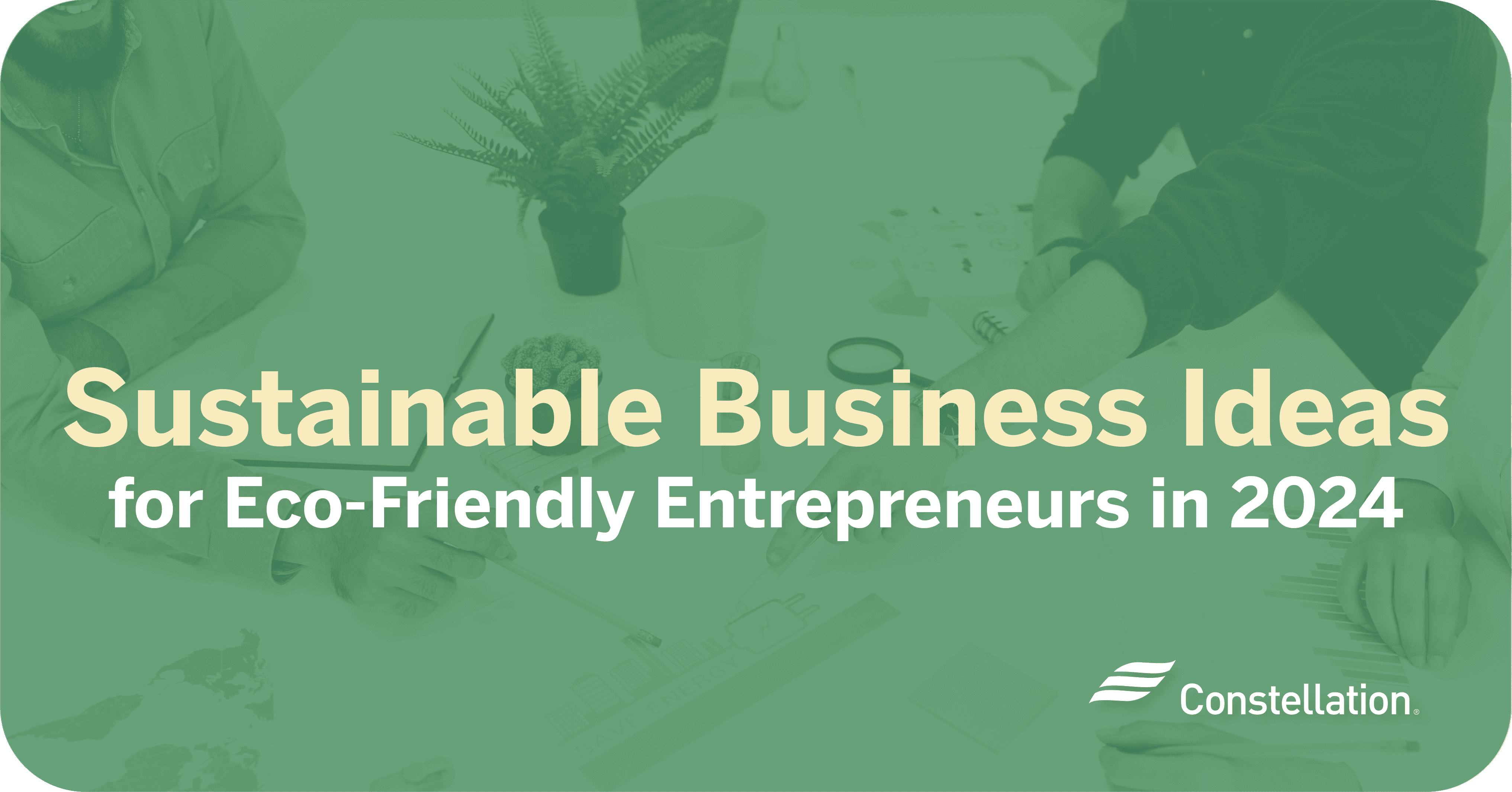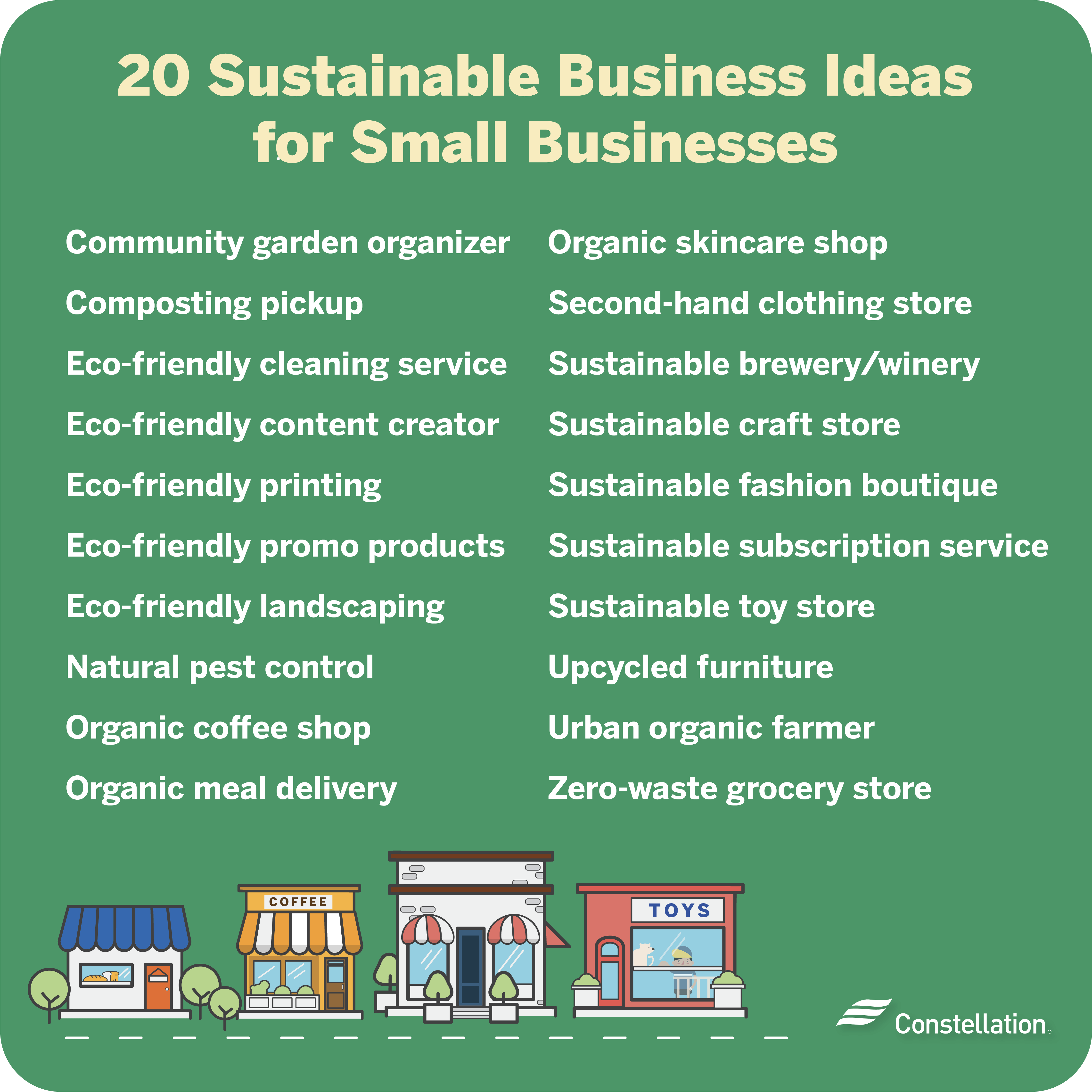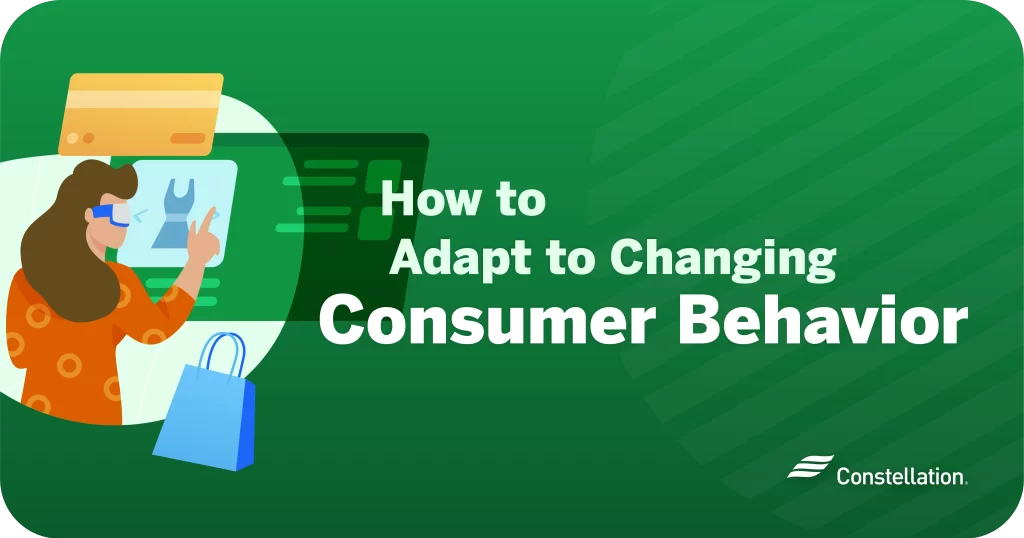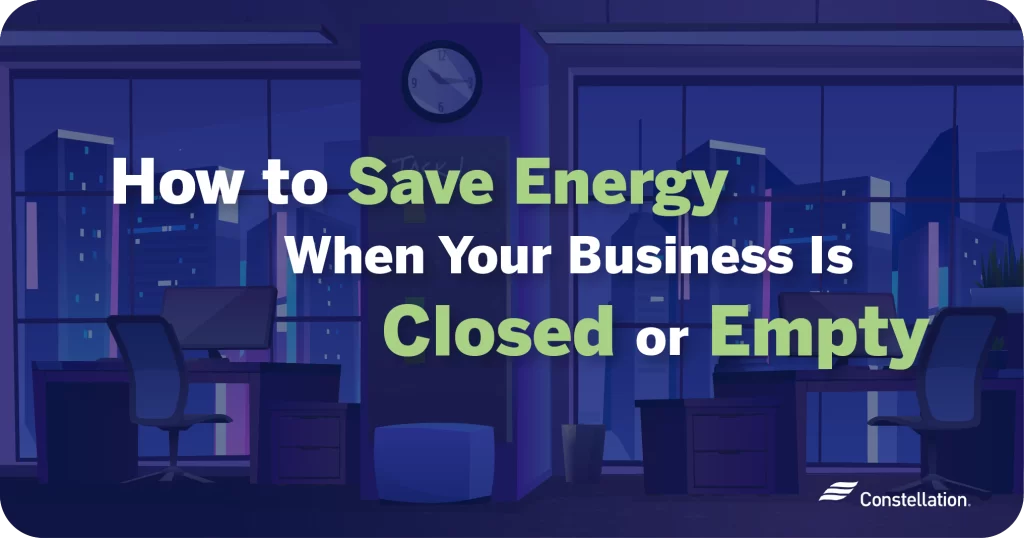
- Category:
Small Business Energy Savings -
Last updated:
November 22, 2024
Sustainable Business Ideas for Eco-Friendly Entrepreneurs in 2024
Consumers increasingly demand sustainable small business practices and want products and services that are eco-friendly. According to a recent PWC survey, almost 85% of consumers report that they are experiencing disruptions in their daily lives due to climate change. That is a powerful motivation to make changes.
Indeed, 46% of respondents are switching to more sustainable products and will pay, on average, 9.7% more for items that claim to have reduced their impact on the environment, even factoring in the rising cost of living in 2024.
As more consumers favor eco-friendly businesses, meeting these expectations can be good for your business. Here are some sustainable business examples to help you start thinking about changes you can make.
20 eco-friendly small business ideas to help protect the environment and reduce carbon emissions
These sustainable business ideas can help your small business stand out from the competition, win new customers and perhaps even earn a premium price.
1. Organic meal delivery service or restaurant
Delivering meals made from ingredients free of fertilizers, pesticides and antibiotics, and that are non-GMO, is a great way to capitalize on the growing trend toward healthier eating. Starting a restaurant that uses locally sourced, organic ingredients is a way to stand out while also minimizing your carbon footprint by cutting out the need to transport food over long distances.
2. Sustainable toy store
One of the more fun eco-friendly business ideas is to sell toys made from natural, non-toxic and recycled or recyclable materials. According to a Toy Association survey, 45% of U.S. parents under the age of 40 take a toy’s environmental impact into account when making purchasing decisions. You will attract a clientele that values quality and is willing to pay for it.
3. Eco-friendly cleaning supplies or service
You can contribute to the health of customers and reduce the impact that cleaning has on the environment by starting an eco-friendly cleaning service or selling organic cleaning supplies. Selling products that are free of VOCs and other toxic chemicals, such as sulfates and parabens, creates healthier indoor air, reduces the toxins customers could absorb through the skin and keeps these chemicals from going down the drain to pollute soil and waterways.
4. Sustainable fashion boutique
The processes for making fast fashion often use harsh chemicals, require goods to be shipped long distances and waste resources. Opening a store that is devoted to clothing made from locally sourced, organic, natural or recycled materials and that emphasizes quality garments made to last, can have a positive impact on the environment and health of customers.
5. Environmentally friendly landscaping services
Environmentally friendly small businesses in lawn and garden design and care help customers choose native plants that contribute to the local natural ecosystem. Environmentally friendly landscaping reduces the introduction of invasive species, and creates spaces that cut down on erosion and runoff. You can also minimize heat islands and make the best use of available water and nutrients.
6. Urban organic farmer
Areas where space is at a premium are also where you may find a sizable and eager market of customers. Growing and selling organic produce in densely populated areas can be lucrative. Use vertical farming and hydroponics to make the most of limited space. The trend to urban agriculture also cuts down on carbon used for shipping and food lost to waste in transit. Urban agriculture also contributes to climate resilience.
7. Zero-waste grocery store
Reduce plastic in the lives of consumers by opening a zero-waste food store. This retail concept is based on customers buying only what they need from bulk bins and dispensers, and bringing their own reusable packaging. Reducing plastic and waste are two benefits from this eco-friendly business idea.
8. Sustainable brewery or winery
Relaxing with a cold brew or refreshing glass of wine is all the better when you don’t guzzle sulfite preservatives with your beverage. Making or retailing beverages made using organic ingredients and that are produced using sustainable methods brings a superior product to market that will please discerning consumers.
9. Composting pickup service
Composting organic waste is a good way to reduce the bulk of material headed to landfills, while also contributing to abundant crops. Yet people who need compost are not always able to make it. Contribute to the supply and value chain by starting a business that produces and sells compost to gardeners and farmers.
Composting not only improves soil quality and adds nutrients to produce grown in it, it reduces greenhouse gas emissions that form from decomposing trash in landfills.
10. Upcycled furniture business
Disposable furniture is both a waste of resources and a burden on landfills. Refurbishing old furniture or making new furniture from reclaimed wood and repurposed materials creates attractive, useful and desirable pieces that will last through the years. Upcycled furniture reduces the problem of what to do with growing volumes of trash.
11. Second-hand clothing store
Retailing gently used apparel is a way to give garments a second life. Many people get rid of clothes because they don’t fit right, were bought for a one-time event or no longer want the piece but can’t return it. Clothes are rarely used up and thrown away as useless rags. Reselling previously loved items puts an end to the waste. Clothing items get into the hands of people who want and need them.
12. Eco-friendly printing service
In thinking about sustainable business ideas, putting sustainable printing practices into action in a business that reduces the environmental impact of necessary communications can win in the marketplace. Using sustainable materials, such as recycled paper with vegetable-based inks, and employing energy-efficient printing equipment and processes, contributes to an eco-friendly business for you and for your clients.
13. Eco-friendly product subscription service
While many people want to live a more sustainable lifestyle, they may not have the time or resources to find the best products to achieve that goal. You can create a business that serves this need by curating monthly boxes of eco-friendly and local products and providing them to subscribers or members.
14. Sustainable craft store
To help people surround themselves with eco-friendly home and work environments, a sustainable craft store can provide works of art and decor that are good for the environment. You can also serve the creative impulse of people by retailing non-toxic, natural materials and art supplies.
15. Organic coffee shop
For people who need and want their daily jolt of coffee, offering eco-friendly options is welcome and wanted. Sourcing biodiverse coffee that is grown with care for soil health and water usage can protect threatened rainforests in coffee-producing countries.
Coffee grown without chemicals and protected from mold and contaminants creates a higher-quality product. Supporting farmers and farm workers with fair trade practices also contributes to sustainability. Starting an organic coffee shop is a great eco-friendly business example that will help you successfully compete against powerful national chains.
16. Natural pest control service
Pest management is necessary for the health, safety and comfort of people in residential and public environments. Yet toxic chemicals can work at cross-purposes to achieve these benefits. Offering highly effective, yet non-toxic, pest control methods and substances can protect people and pets from a wide variety of pests without adding health risks.
17. Eco-friendly promotional products
Support companies who use branded promotional and gift items to build relationships by providing items that are sustainable. Well-made vs. cheap, disposable items, and gifts made using sustainable materials, give companies better options than what is typically offered. You will help them prove to their customers that they care about the environment by marketing eco-friendly promotional products that support their brands.
18. Community garden organizer
Community gardens are a great way to reduce greenhouse gas emissions, build a sense of belonging and bring flowers and nutritious produce directly to the local community. While the benefits are obvious, creating, organizing and running community gardens is a lot of work. Offering a community garden management service creates a real business opportunity.
19. Eco-friendly content creator/influencer
Promoting the value of eco-friendly business ideas and providing practical how-to tips will help more entrepreneurs put them into practice. As a sustainable business ideas influencer, you can gather a following and monetize it, creating a business for you as you promote better ways for businesses to earn money and serve the community.
20. Organic skincare shop
The things that we put on our bodies to stay clean, maintain health and look our best should be good for our well-being. Using natural ingredients and avoiding toxic chemicals in skincare products is something more and more people care about. You can open a skincare shop that markets high-quality products made without synthetic chemicals, parabens, sulfates and artificial fragrances, to appeal to people who value sustainable and healthy skincare.
Why start an eco-friendly business?
Starting an eco-friendly business and putting sustainable business ideas into practice can be profitable, help reduce carbon emissions and contribute to a healthier world.
Eco-friendly businesses have significant benefits. You will have a positive impact on the environment and have a business that is more resilient over the long run. You can differentiate yourself in competitive markets and attract eco-conscious consumers who are willing to pay more. Sustainable practices reduce waste, make the best use of resources and are energy-efficient, leading to lower operational costs and higher profitability.
Whichever of these sustainable small businesses examples appeals to you, the two most important things are:
- Be authentic. Any claims that are not true will come across as greenwashing and will be counter-productive.
- Let people know. Be sure to tell your sustainability story so that people can value what you do.
Constellation is here to support your small business success, profitability and sustainability moving forward.





